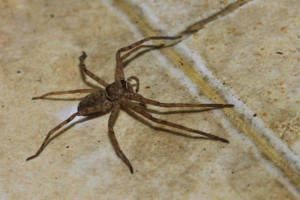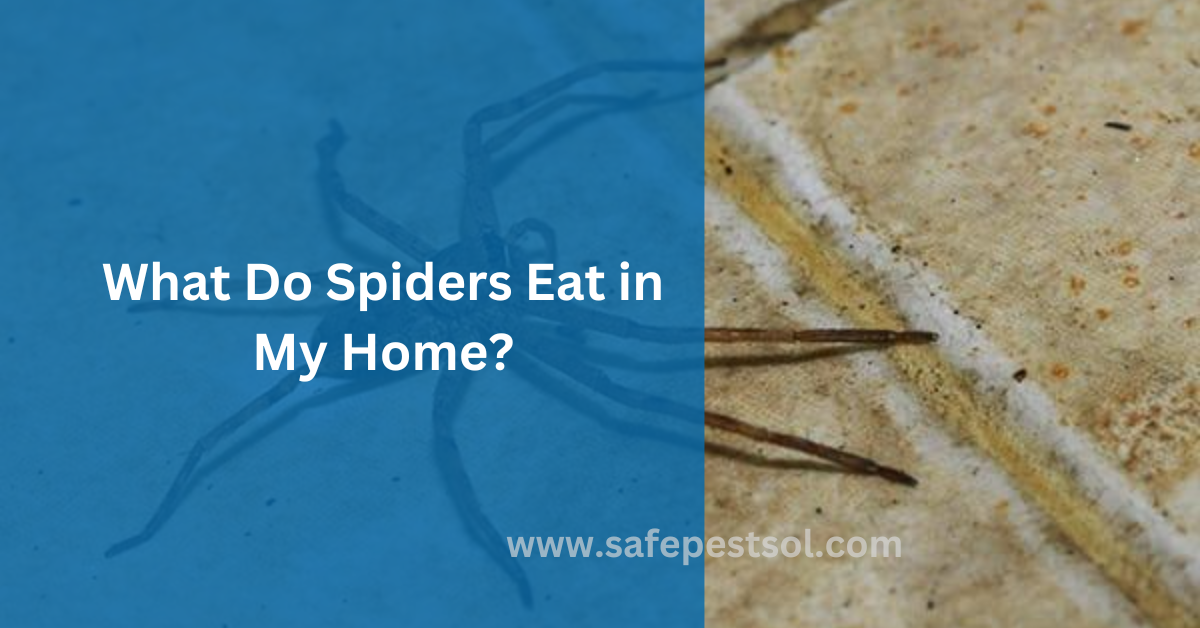What Do Spiders Eat in My Home?
Since crawling spiders can scare anyone, it’s natural to wonder what they eat in your house. Most of these eight-legged insects get into a home looking for shelter and food and aren’t there to cause problems. Moreover, their diet usually consists of insects, which eventually help kill unwanted pests in a house.
So, this blog explores what the common house spiders typically feed on, how often they need food, and ways to get rid of them if they start irritating.

Is Seeing Spiders in Your Home Concerning?
Mostly, seeing spiders is not always a clear sign of an infestation. Most house spiders accidentally get into your house or, most of the time, look for insects to eat. In most cases, you will find that it’s not harmful or frightening when you see a few.
Most of the indoor spiders are harmless and very small; they just spend their time catching flies, ants, and moths. Actually, they are helpful because they reduce the number of unwanted bugs inside.
But there are some venomous spiders as well, such as the black widow or the brown recluses. However, they do not typically live indoors. They are fond of secluded areas rather than human areas.
In other words, having some spiders can even be considered a plus. These creatures feed on diverse insects, which can help in getting rid of flying or creeping pests inside your home.
So, it is quite obvious to see spiders and get scared, most of the time spiders are actually much more good than bad.
What Do Spiders Mostly Eat in Your Home?
Mostly, spiders eat insects to survive. These insects may include:
- Flies and mosquitoes
- Ants, fleas, and even other spiders
- Crickets, moths, wasps, and other small bugs
Spiders in a house have two major forms of capturing prey: web-spinning and hunting and by hunting. Spiders that web-spin to capture prey include the orb weavers and the common house spider.
After an insect flies into their web, they get stuck; then the spider may inject its venom to kill it. Hunting spiders, wolf spiders, and jumping spiders do not spin webs; they hunt for prey as they roam across the floor, walls, or other hidden places.
In fact, some powerful spiders in nature can even able to consume small animals or birds. For example, a goliath bird eater can consume smaller mammals and birds. The giant types are rarely encountered in houses and are most commonly located in forests and jungles.
House spiders do not mainly feed on plant materials but restrict themselves to eating insects. It catches the prey, uses their digestive fluids, and then eats the liquefied remains.
Do Spiders Eat Plants?
Most spiders are strict carnivores and won’t even eat plants, vegetables, or any greenery. Their digestive system is not meant to digest any plant-based food. However, there is a unique spider species known as the Bagheera kiplingi, which has an unusual diet that can eat acacia leaves.
This spider, found in Central America, consumes plant-based food due to its specific habitat and relationship with acacia plants.
This is the only known species of spider that eats plants, and you’re unlikely to see it indoors. So, your indoor plants are safe from typical house spiders because they like to hunt for insects rather than plant material.
Their presence won’t damage your greenery; on the contrary, they’re helping control other pests that might damage your plants.
How Often Do Spiders Need to Eat?
Spiders are well-equipped to survive on scarce food. Their feeding habits depend on their size, species, and environment, but generally, spiders can even survive for many days without eating food. Here’s a breakdown of their feeding habits:
- Hunting spiders: These active hunters, such as wolf spiders, often eat whenever they catch prey. If they encounter bugs frequently, they will eat food regularly.
- Web-building spiders: They do wait for their prey in a web and only consume once there is something caught up. They may consume their meals several times a day if they have caught many insects; otherwise, they can survive for several days or weeks without consuming anything if the source is a little scarce.
So the spider can live for as long as several days. If food sources are scarce, they save energy from stored sources so they can live for longer. This also enables them to be strong, even in circumstances with little food.
How to Get Rid of Spiders in Your Home
No matter how many benefits a spider can bring, there is always a risk of having them in your house. Here are some strategies for safely controlling spider populations in your home:
- Declutter your home: Spiders require quiet, dirty places with many hiding sites. So, create a clean area and arrange places so they can’t live as they need.
- Seal cracks and entry points: Spiders can enter using holes that are close to windows, doors and near air conditioning appliances. Closing off such areas to not letting spiders slide into your house.
- Turn off outdoor lights at night: Light attracts bugs and bugs attract spiders. Dimming or turning off those outdoor lights reduces the possibility of bugs coming into your home.
Conclusion
You might creep out by seeing spiders in your home but they help keep other pests away through catching and eating them. Knowing what spiders eat in my home will help you understand the reason why there are spiders in your home
Most house spiders are harmless to humans because they feed on smaller bugs and not on humans or plants. If you keep your house clean and seal entry points, you will discourage spiders from entering your home.
FAQs
1.Why do spiders come into my home?
Spiders often enter homes for warmth, shelter, and access to insects to eat. They’re attracted to areas where they can easily find food, like flies, ants, and moths.
2.Do house spiders bite humans?
Most house spiders are harmless and prefer to avoid human contact. Bites are rare and usually occur only if a spider feels threatened.
3.Can I get rid of spiders without harming them?
Yes, there are gentle ways to manage spiders without harm. You can clean regularly to remove webs, seal cracks to prevent entry, and use natural repellents like peppermint oil to keep spiders away.
Get Instant Solution of Spiders!
It can be dangerous to have venomous spiders in your home. In such situations, it should be your priority to get in touch with professional pest control services like Safe pest sol to stay secure and safe.

